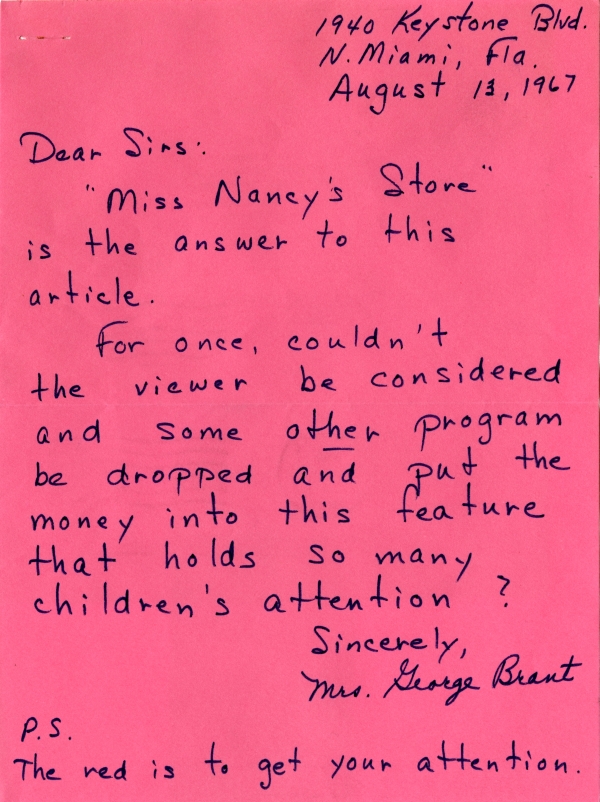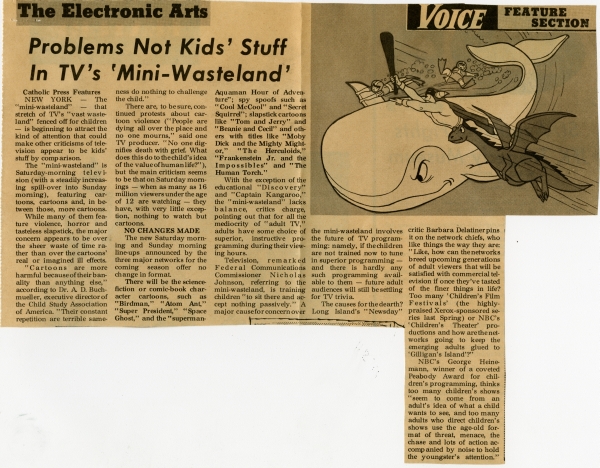Florida Memory is administered by the Florida Department of State, Division of Library and Information Services, Bureau of Archives and Records Management. The digitized records on Florida Memory come from the collections of the State Archives of Florida and the special collections of the State Library of Florida.

State Archives of Florida
- ArchivesFlorida.com
- State Archives Online Catalog
- ArchivesFlorida.com
- ArchivesFlorida.com
State Library of Florida
Related Sites

Description of previous item
Description of next item

Letter from Mrs. George Brant about the cancellation of "Miss Nancy's Store"
Source
Description
Date
Creator
Contributors
Format
Coverage
Topic
Subjects
Geographic Term
General Note
1940 Keystone Blvd.
N. Miami, Fla.
August 13, 1967
Dear Sirs:
"Miss Nancy's Store" is the answer to this article.
For once, couldn't the viewer be considered and some other program be dropped and put the money into this feature that holds so many children's attention?
Sincerely,
Mrs. George Brant
P.S.
The red is to get your attention.
Title
Subject
Description
Creator
Source
Date
Contributor
Format
Language
Type
Identifier
Coverage
Geographic Term
Thumbnail
ImageID
topic
Subject - Corporate
Subject - Person
Transcript
1940 Keystone Blvd.
N. Miami, Fla.
August 13, 1967
Dear Sirs:
"Miss Nancy's Store" is the answer to this article.
For once, couldn't the viewer be considered and some other program be dropped and put the money into this feature that holds so many children's attention?
Sincerely,
Mrs. George Brant
P.S.
The red is to get your attention.
The Electronic Arts
VOICE FEATURE SECTION
Problems Not Kids' Stuff In TV's 'Mini-Wasteland'
[first column]
Catholic Press Features
NEW YORK - The "mini-wasteland" - that stretch of TV's "vast wasteland" fenced off for children - is beginning to attract the kind of attention that could make other criticisms of television appear to be kids' stuff by comparison.
The "mini-wasteland" is Saturday-morning television (with a steadily increasing spill-over into Sunday morning), featuring cartoons, cartoons and, in between those, more cartoons.
While many of them feature violence, horror and tasteless slapstick, the major concern appears to be over the sheer waste of time rather than over the cartoons' real or imagined ill effects.
"Cartoons are more harmful because of their banality than anything else," according to Dr. A. D. Buchmueller, executive director of the Child Study Association of America. "Their constant repetition are terrible same-
[second column]
ness do nothing to challenge the child."
There are, to be sure, continued protests about cartoon violence ("People are dying all over the place and no one mourns," said one TV producer. "No one dignifies death with grief. What does this do to the child's idea of the value of human life?"), but the main criticism seems to be that on Saturday mornings - when as many as 16 million viewers under the age of 12 are watching - they have, with very little exception, nothing to watch but cartoons.
NO CHANGES MADE
The new Saturday morning and Sunday morning line-ups announced by the three major networks for the coming season offer no change in format.
There will be the science-fiction or comic-book character cartoons, such as "Birdman," "Atom Ant," "Super President," "Space Ghost," and the "superman-
[third column]
Aquaman Hour of Adventure"; spy spoofs such as "Cool McCool" and "Secret Squirrel"; slapstick cartoons like "Tom and Jerry" and "Beanie and Cecil" and others with titles like "Moby Dick and the Mighty Mightor," "The Herculoids," "Frankenstein Jr. and the Impossibles" and "The Human Torch."
With the exception of the educational "Discovery" and "Captain Kangaroo," the "mini-wasteland" lacks balance, critics charge, pointing out that for all the mediocrity of "adult TV," adults have some choice of superior, instructive programming during their viewing hours.
Television, remarked Federal Communications Commissioner Nicholas Johnson, referring to the mini-wasteland, is training children "to sit there and accept nothing passively." A major cause for concern over
[fourth column]
the mini-wasteland involves the future of TV programming: namely, if the children are not trained now to tune in superior programming - and there is hardly any such programming available to them - future adult audiences will still be settling for TV trivia.
The causes for the dearth? Long Island's "Newsday"
[fifth column]
critic Barbara Delatiner pins it on the network chiefs, who like things the way they are: "Like, how can the networks breed upcoming generations of adult viewers that will be satisfied with commercial television if once they've tasted of the finer things in life? Too many 'Children's Film Festivals' (the highly-praised Xerox-sponsored series last Spring) or NBC's 'Children's Theater' productions and how are the networks going to keep the emerging adults glued to 'Gilligan's Island?"
NBC's George Heinemann, winner of a coveted Peabody Award for children's programming, thinks too many children's shows "seem to come from an adult's idea of what a child wants to see, and too many adults who direct children's shows use the age-old format of threat, menace, the chase and lots of action accompanied by noise to hold the youngster's attention."
General Note
Chicago Manual of Style
Brant, George. Letter from Mrs. George Brant about the cancellation of "Miss Nancy's Store". 1967-08-13. State Archives of Florida, Florida Memory. <https://www.floridamemory.com/items/show/326664>, accessed 13 February 2026.
MLA
Brant, George. Letter from Mrs. George Brant about the cancellation of "Miss Nancy's Store". 1967-08-13. State Archives of Florida, Florida Memory. Accessed 13 Feb. 2026.<https://www.floridamemory.com/items/show/326664>
AP Style Photo Citation
(State Archives of Florida/Brant)

 Listen: The World Program
Listen: The World Program